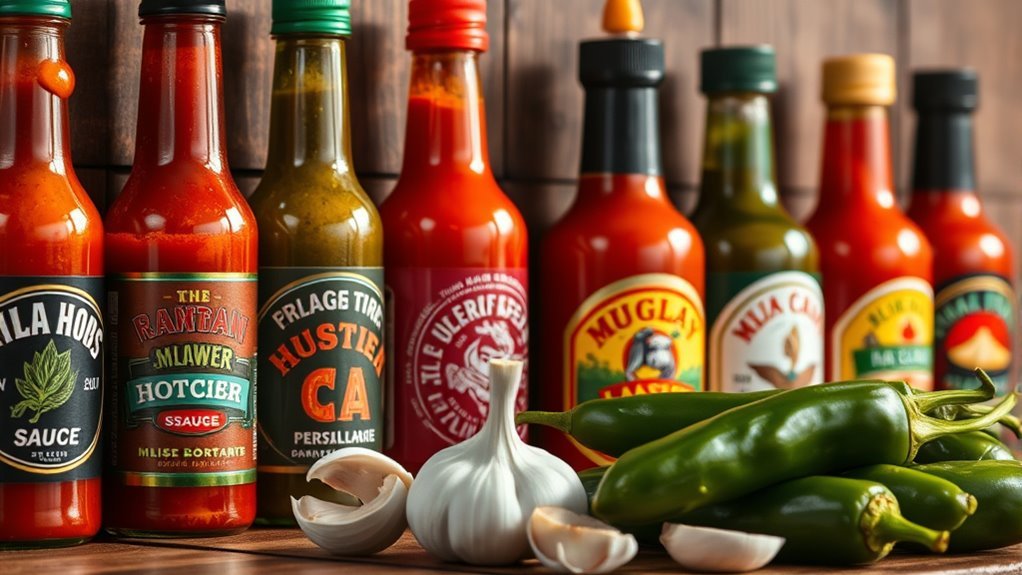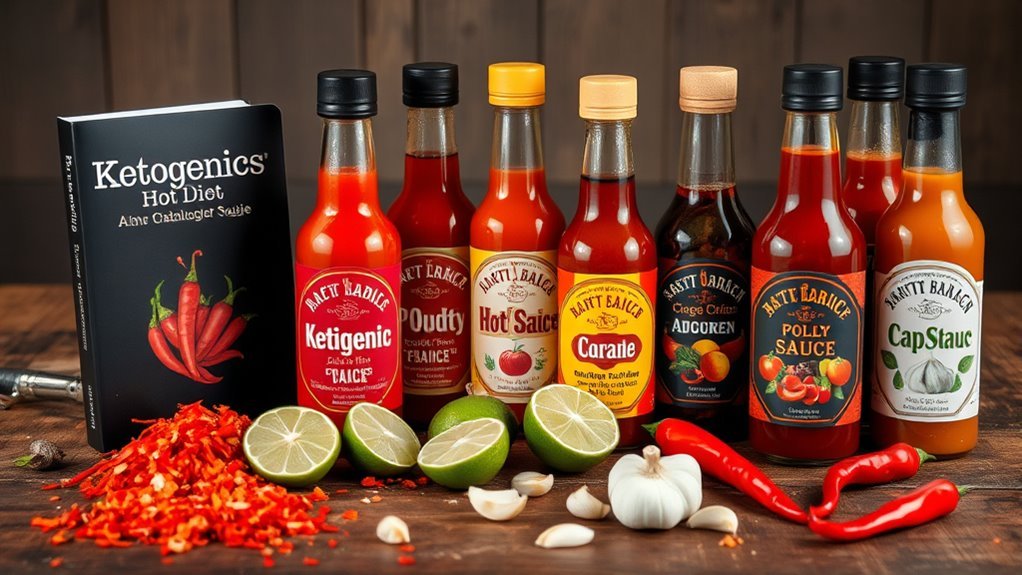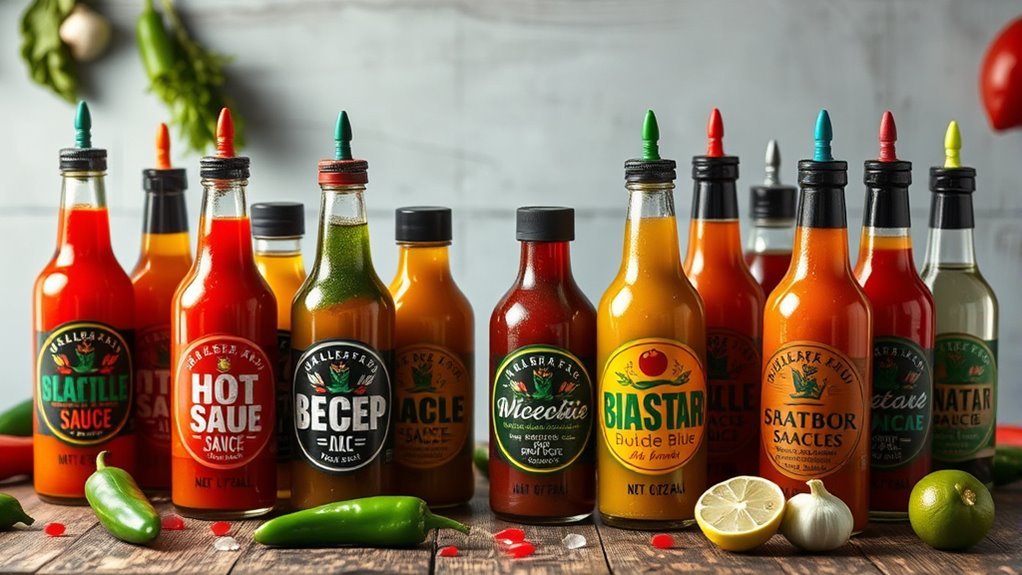Yes, hot sauce is generally keto-friendly due to its low carbohydrate content, making it a great condiment choice for your meals. Most varieties contain 0-1 gram of carbs per serving, but it’s important to check for added sugars in some brands, which can increase the carb content. You can enhance your high-fat meals without breaking your diet. Curious about how to incorporate hot sauce into your keto meals or which brands to choose? Keep exploring for more tips!
Understanding the Basics of Hot Sauce

When you think about hot sauce, you might just envision a fiery condiment that adds heat to your meals, but there’s more to it than that. The history of hot sauce spans centuries, with origins traced back to ancient cultures like the Aztecs and Mayans, who used chili peppers in various forms. Over time, hot sauce has evolved, showcasing diverse flavor profiles that include sweet, smoky, and tangy notes. Each region adds its unique twist, reflecting local ingredients and culinary traditions. Whether you’re dousing your tacos or experimenting with marinades, understanding hot sauce’s rich history and varied flavors can elevate your cooking experience. Embrace the freedom to explore this dynamic condiment, enhancing your meals beyond just heat.
Common Ingredients in Hot Sauce

Hot sauce is more than just a fiery condiment; it’s a blend of ingredients that come together to create unique flavors. Understanding these common ingredients can help you appreciate the craft behind each bottle.
- Vinegar types: Vinegar acts as a base, with options like white, apple cider, and malt adding distinct tanginess.
- Pepper varieties: The heat level and flavor profile often depend on the peppers used, such as jalapeños, habaneros, or cayenne.
- Additional spices: Many hot sauces incorporate spices like garlic, onion, or even fruit for added complexity.
Carb Content in Different Types of Hot Sauce

When considering the carb content in hot sauce, it’s important to look at the ingredients used in various brands and homemade options. Popular hot sauces can vary greatly in their nutritional profiles, especially when it comes to added sugars or thickening agents. By comparing these factors, you can make informed choices that align with your keto diet.
Hot Sauce Ingredients Overview
While many people enjoy adding hot sauce to their meals for an extra kick, it’s essential to understand the ingredients and their carb content, especially if you’re following a keto diet. Different hot sauce varieties can vary widely in their carb content due to their unique flavor profiles. Here’s a quick overview of common ingredients you might find:
- Chili peppers: Generally low in carbs and packed with flavor.
- Vinegar: Adds acidity without significant carbs.
- Sweeteners: Some sauces may include sugars or artificial sweeteners, increasing carb counts.
Popular Brands Comparison
If you’re following a keto diet, understanding the carb content in popular hot sauce brands can help you make informed choices. Brand comparisons reveal that many hot sauces, like Frank’s RedHot and Tabasco, have minimal carbs—usually around 0-1 gram per serving. These sauces not only fit into your keto lifestyle but also offer distinct flavor profiles that can elevate your meals. On the other hand, some sauces, particularly those with added sugars, can contain higher carb counts. For instance, certain sweet chili sauces may pack several grams per serving. Always check labels and choose wisely to maintain your keto goals while enjoying the zing of hot sauce. Knowledge of these variations empowers your culinary freedom.
Homemade Options Nutritional Value
Creating your own hot sauce at home can be a rewarding way to control the ingredients and nutritional value, especially when it comes to carb content. By making your own, you can tailor the heat levels and flavor profiles to your liking while keeping carbs in check.
Here are some key considerations for homemade hot sauces:
- Base Ingredients: Fresh peppers, vinegar, and spices generally contain minimal carbs.
- Sweeteners: Avoid added sugars; opt for alternatives like erythritol if you prefer sweetness.
- Serving Size: Keep portions small to maintain low carb intake.
Crafting your hot sauce allows you to enjoy bold flavors without jeopardizing your keto goals. With a little experimentation, you’ll find the perfect balance of heat and taste!
Nutritional Benefits of Hot Sauce
Hot sauce can be a low-calorie way to add flavor to your meals without derailing your diet. The capsaicin in spicy foods is known to boost metabolism, potentially aiding in weight management. By incorporating hot sauce into your dishes, you not only enhance taste but also may reap some health benefits.
Low-Calorie Flavor Boost
While many people seek flavor without adding extra calories, hot sauce can be an excellent ally in your culinary endeavors. This low-calorie alternative offers a potent flavor enhancement that can transform even the simplest dishes. Plus, it packs a nutritional punch with minimal impact on your diet.
Consider these benefits of incorporating hot sauce:
- Boosts Flavor: A few dashes can elevate bland meals without the need for calorie-laden sauces.
- Variety of Options: With numerous types available, you can experiment to find the perfect match for your dish.
- Minimal Calories: Most hot sauces contain negligible calories, allowing you to enjoy bold flavors guilt-free.
Metabolism and Spicy Foods
Incorporating hot sauce into your meals doesn’t just enhance flavor; it may also provide benefits for your metabolism. Research suggests that spicy foods, particularly those containing capsaicin—found in many hot sauces—can boost your metabolic rate. This spicy metabolism effect can lead to increased calorie burning, making it a useful addition for those pursuing weight management goals. Hot sauce benefits extend beyond just metabolism; it may help regulate appetite and improve digestive health. However, moderation is key. While hot sauce can spice up your diet, consuming excessive amounts might irritate your digestive system. So, feel free to enjoy that kick of flavor, knowing it could support your metabolic health while keeping your meals exciting and vibrant.
How to Use Hot Sauce on a Keto Diet
When you’re following a keto diet, using hot sauce can be a flavorful way to enhance your meals without adding unnecessary carbs. Here are some tips to incorporate hot sauce into your diet effectively:
- Spice Up Proteins: Drizzle hot sauce over grilled chicken, steak, or fish for a zesty kick.
- Flavorful Dips: Mix hot sauce into avocado or sour cream to create a creamy dip, perfect for veggies.
- Keto-Friendly Recipes: Experiment with hot sauce in marinades or salad dressings to explore new flavor combinations.
Popular Keto-Friendly Hot Sauce Brands
If you’re looking to add some heat to your meals without compromising your keto lifestyle, choosing the right hot sauce is crucial. Here are some popular keto-friendly brands that cater to various flavor profiles:
| Brand | Flavor Profile | Notes |
|---|---|---|
| Frank’s RedHot | Mild and tangy | Versatile for many dishes |
| Tapatío | Spicy and savory | Great for Mexican dishes |
| Cholula | Balanced and smoky | Perfect for tacos and eggs |
| Sriracha | Sweet and spicy | Use sparingly; check the label |
These brand recommendations guarantee you’re enjoying that spicy kick while staying within your keto limits. Always check ingredient labels for added sugars to make the best choices for your diet!
Tips for Making Your Own Keto Hot Sauce
For those who prefer a personal touch in their meals, making your own keto hot sauce can be a rewarding experience. Not only do you control the ingredients, but you can also explore homemade variations that suit your taste. Here are some tips to get you started:
- Choose your peppers: Experiment with different types, like jalapeños or habaneros, for unique flavors.
- Use fermentation techniques: Fermenting your peppers can enhance flavor and add probiotics, making your sauce even healthier.
- Balance flavors: Incorporate vinegar, garlic, or herbs to create a well-rounded profile that complements your dishes.
Frequently Asked Questions
Can Hot Sauce Trigger Digestive Issues on a Keto Diet?
Did you know that nearly 25% of people report experiencing digestive sensitivity to spicy ingredients? If you’re diving into hot sauce while on a keto diet, it could trigger digestive issues for some. The capsaicin in hot sauce may irritate your stomach lining, especially if you’re not used to that level of spice. So, it’s wise to start slow, listen to your body, and adjust accordingly to maintain your keto journey comfortably.
Is There a Limit to How Much Hot Sauce I Can Consume?
There isn’t a strict limit on how much hot sauce you can consume, but moderation is key. While hot sauce offers benefits like boosting metabolism and enhancing flavor, too much can lead to digestive issues. Spicy food in moderation helps you enjoy its perks without discomfort. Listen to your body; if you experience irritation or discomfort, it might be time to cut back. Enjoy your meals, but balance is essential for overall well-being.
Can I Use Hot Sauce for Meal Prepping on Keto?
Absolutely, you can use hot sauce for meal prepping! It’s a fantastic way to add flavor enhancement without adding carbs, making your meals more enjoyable. Just be mindful of the ingredients; some sauces may contain sugars or additives that aren’t keto-friendly. Opt for those with minimal ingredients for the best results. With the right hot sauce, you’ll keep your meals exciting while sticking to your keto lifestyle, giving you the freedom to enjoy every bite!
Are There Any Preservatives in Store-Bought Hot Sauces?
Ever wonder what’s lurking in your favorite hot sauce? Many store-bought varieties do contain preservatives, which can vary by brand. You might find sugar substitutes or different vinegar types that enhance flavor but can also add unwanted additives. Always check the label to guarantee you’re aware of what you’re consuming. Opt for brands that prioritize natural ingredients if you want to stay clear of preservatives and maintain that freedom in your diet.
How Should I Store Homemade Hot Sauce?
To store your homemade hot sauce effectively, it’s best to use airtight containers like glass jars or plastic squeeze bottles. Make sure to label them with the date for freshness. Refrigeration tips include keeping your sauce in the coldest part of your fridge to maintain flavor and prevent spoilage. It can last several weeks this way, allowing you to enjoy your creation while savoring the freedom of crafting your unique flavors!
Frequently Asked Questions about Hot Sauce and Keto
1. Is hot sauce keto-friendly?
Yes, most hot sauces are keto-friendly. They are typically low in carbohydrates, with many varieties containing less than 1 gram of carbs per serving. However, it’s important to check the label for added sugars or other ingredients that may not align with a ketogenic diet.
2. What are the best hot sauces for a keto diet?
The best hot sauces for a keto diet include those that are made from natural ingredients without added sugars. Popular brands like Frank’s RedHot, Tabasco, and Cholula often have low-carb options. Always read the ingredient list to ensure it aligns with your dietary needs.
3. Can I make my own keto-friendly hot sauce?
Absolutely! Making your own hot sauce allows you to control the ingredients. A simple recipe includes blending hot peppers, vinegar, garlic, and spices. You can experiment with different peppers for varying heat levels while avoiding any sugars or high-carb ingredients.
4. Does hot sauce have any health benefits on a keto diet?
Yes, hot sauce can have several health benefits. The capsaicin found in hot peppers has been linked to increased metabolism and fat burning, which can be beneficial on a keto diet. Additionally, hot sauce can enhance the flavor of meals, making it easier to stick to your dietary goals by adding variety to your meals.
5. Are there any hot sauces I should avoid on a keto diet?
Yes, you should avoid hot sauces that contain added sugars, high fructose corn syrup, or other high-carb ingredients. Some sweet chili sauces or specialty hot sauces may have a higher carb content. Always check the nutrition facts and ingredient list to make sure they fit within your keto guidelines.
References
- https://www.healthline.com/nutrition/hot-sauce-keto
- https://www.ketodietapp.com/Blog/post/Is-Hot-Sauce-Keto-Friendly
- https://www.ncbi.nlm.nih.gov/pmc/articles/PMC6520975/
- https://www.webmd.com/diet/obesity/what-is-keto-diet
- https://www.verywellfit.com/what-is-the-keto-diet-5189669
- https://www.cdc.gov/healthyweight/healthy_eating/index.html


